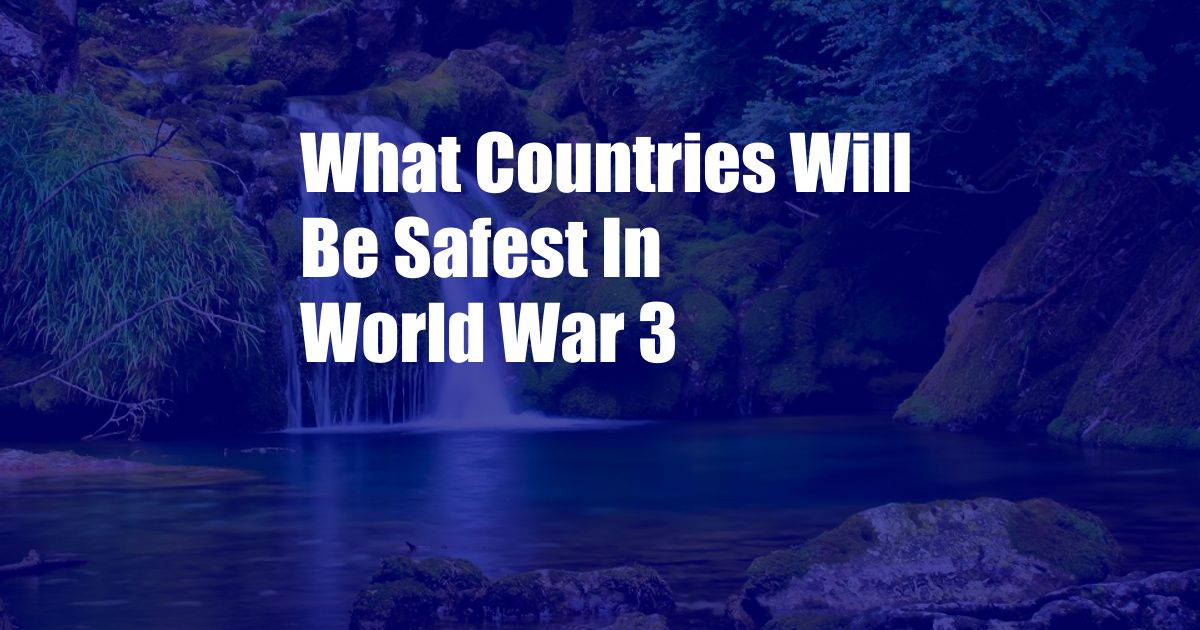
What Countries Will Be Safest in World War 3?
A Thought-provoking Exploration
As tensions escalate around the globe, the grim specter of World War 3 looms over us. While the likelihood of such a catastrophic event remains uncertain, it’s a thought that weighs heavily on the minds of many. In the event of such a conflict, which countries are likely to emerge as the safest havens?
This article delves into this complex question, examining key factors that determine a country’s vulnerability to war and its potential for stability during a global conflict. We’ll explore geographical isolation, political neutrality, economic resilience, and the strength of military alliances.
Geographical Isolation: A Natural Fortress
Countries with a favorable geographical location, whether isolated by vast oceans or protected by rugged terrain, may enjoy a significant advantage in times of war. The distance from potential battlefields reduces the risk of direct attacks, bombings, or ground invasions.
Examples of geographically isolated countries include Iceland, New Zealand, and Australia. These nations have the added advantage of being surrounded by vast bodies of water, making them difficult to reach for hostile forces. New Zealand, in particular, benefits from its remote location in the South Pacific, far from major conflict zones.
Political Neutrality: Steering Clear of the Storm
Maintaining political neutrality can be a strategic move during a global conflict. Countries that avoid aligning themselves with warring factions or engaging in disputes with other nations may reduce their risk of becoming targets.
Switzerland has a long-standing tradition of neutrality, which has served it well in times of war. By refraining from taking sides, Switzerland has managed to stay out of major conflicts and preserve its peace. Other examples of neutral countries include Ireland, Costa Rica, and Sweden. By distancing themselves from international tensions, these nations can potentially minimize the likelihood of becoming battlegrounds.
Economic Resilience: Weathering the Storm
A country’s economic strength and resilience can play a crucial role in its stability during wartime. Nations with robust economies, strong infrastructure, and ample resources are better equipped to withstand the strains of conflict.
Germany, for instance, has a highly developed economy and a diversified industrial base. This allows the country to maintain production and maintain essential services even in the face of disruptions caused by war. Other countries with strong economies, such as the United States, China, and Japan, are also likely to fare better economically during a global conflict.
Strength of Military Alliances: Collective Security
Joining military alliances can significantly enhance a country’s security. By forging partnerships with other nations, countries can pool their resources, share intelligence, and coordinate their defense strategies.
NATO, the North Atlantic Treaty Organization, is a prime example of a strong military alliance. Member states agree to provide collective security, meaning they will come to the aid of any member under attack. The United States, as the leading member of NATO, provides a significant deterrent against potential aggressors. Countries that are members of NATO or other similar alliances can benefit from increased protection and reduced vulnerability to нападение.
Tips and Expert Advice for Navigating Uncertain Times
While it’s impossible to predict the exact course of a potential World War 3, certain tips and expert advice can help individuals prepare and mitigate risks:
- Stay informed about international developments and geopolitical tensions.
By monitoring news and analysis from credible sources, individuals can stay abreast of potential threats and adjust their plans accordingly.
- Consider relocating to a geographically isolated or politically neutral country.
If feasible, moving to a safer location before the outbreak of war may provide greater protection from conflict. However, it’s important to research potential destinations thoroughly and consider factors such as visa requirements, cultural differences, and the cost of living.
Frequently Asked Questions
Q: What are the most important factors to consider when determining the safest countries in World War 3?
A: Geographical isolation, political neutrality, economic resilience, and the strength of military alliances are key factors that influence a country’s vulnerability to war and its potential for stability during a global conflict.
Q: Can any country be completely immune to the effects of World War 3?
A: No country can be completely immune to the effects of a global conflict, as even geographically isolated or politically neutral nations may face indirect consequences such as economic disruptions or refugee flows.
Conclusion
The question of which countries will be safest in World War 3 is a complex one, with no easy answers. However, by considering factors such as geographical isolation, political neutrality, economic resilience, and military alliances, we can gain a better understanding of which nations may be better positioned to withstand the challenges of a global conflict.
Ultimately, it’s important to stay informed, consider the available options, and be prepared to adapt to a rapidly changing global landscape. As we navigate these uncertain times, it’s essential to maintain hope and work towards peace and stability around the world.